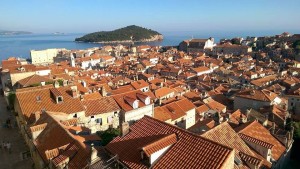 You’ll be thrilled to read that I’ve just come back from a lovely holiday in Southern Croatia, where I did little more than swim, sleep and eat nice things. Two weeks of proper getting away from it.
You’ll be thrilled to read that I’ve just come back from a lovely holiday in Southern Croatia, where I did little more than swim, sleep and eat nice things. Two weeks of proper getting away from it.
But the academic mind never quite turns off. And now, back home and after a quick filleting of emails – pro tip: never try to read two weeks’ worth of Brussels Playbook in one go – I find myself struck by a reflection on the nature of modern life.
We stayed not far from Dubrovnik, a city known to me previously for its great beauty and for its role in the wars in the early 1990s, besieged, a prize to be won. But generally, somewhere distant, apart.
And yet, what was striking when we were there was its familiarity and its cosmopolitan nature.
To take a simple example, in the small village we were based in, I can honestly say I have never seen such a varied collection of car licence plates: not just from the Western Balkans, across western, central, eastern and northern Europe. And this richness and variety continued to the people we met and passed in the street and on the beach.
Dubrovnik itself brings together Venetian, Slavic and Ottoman influences in its old town, a momento of its historic position as a key trading post on the Adriatic, something captured in its fine motto (which makes up the first part of the title of this post).
“All well and good”, you might say, “but so what?”
In a narrow and specific answer, I could say that Dubrovnik has more connection with the UK than I had ever realised. Richard the Lionheart was shipwrecked on the island off Dubrovnik on his return from the Crusades; ships from the city sailed in the Spanish Armada; the scars of the 1991-2 siege recall just a small fragment of a conflict in our lifetimes that no one can recall with any pride.
That might have been where I would stop, with a call to you to say that Britain’s history is entangled not only with Dubrovnik’s and Croatia’s, but all of Europe, and that this speaks to the kind of questions to which I return so often, of identity and our future path. Certainly, that would fit with one of the more stimulating pieces I read on the flight home.
However, it would also be lazy, self-serving and generally unhelpful.
As much as I noticed the British links in Croatia, so I noticed the links with lots of other places too. Likewise, arriving at Gatwick is a good lesson in the connections that the UK has across the globe.
And that is perhaps the bigger point: we live in a complex and deeply interconnected world, and have done for a long time. The fallacy that we have to avoid is to see that complexity and interdependence as a cost, rather than a benefit.
In the debates we have in this country about our identity and our role in the world, we all too often treat the matter as one of a zero-sum game: deepening relations with one institution or part of the world must mean lessening ties with another. Like some bizarre national version of Dunbar’s number, there’s a feeling that we can’t do it all, so we have to pick and chose.
The logic of this has never been clear to me. Perhaps at the margins, I can see that where others are in conflict, it can be tricky to be on good terms with both/all sides. However, to pick the logical example of Yuogslavia’s breakdown, the usual result is that there is too little effort to be on good terms with any side, or to be a constructive force to help find a more peaceable solution.
But more generally, the opportunity cost of engagement seems to be relatively small: indeed, we might consider how eurosceptics want us to have more to do with other parts of the world. The places they mention tend to be those that are outward-looking and constructive with a wide range of partners, both regionally and globally. Likewise, we might reflect on how some EU member states do much more to place themselves on the international stage than others.
The point I would want you to take from this is that – at one level – we have little choice about the matter: we live in the world and we cannot cut ourselves off. History has more than enough examples to offer us of the profound political, economic, social and cultural costs that come with that.
Thus the choice becomes one between slovenly indifference about keeping our good relations and actively managing and improving our connections.
I’m going to suggest – in a deeply unsurprising way – that the latter is the better course. The more we engage, the more we can influence and shape the world around us. That doesn’t mean we’ll also like what happens, but we will like it more than if we sit back and let things happen to us.
And that certainly a zero-sum game, but a positive-sum one. Our experience in building good relations in one area can serve us well in other areas. And that doesn’t come at a cost to our identity: read once more Dubrovnik’s motto and muse on how we keep what is important to us, whatever gets thrown our way.
